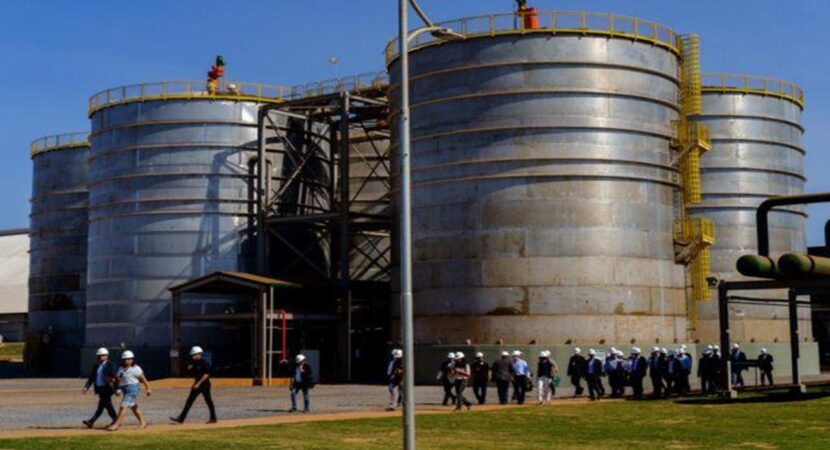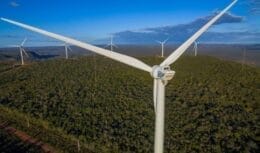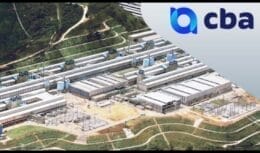
The new plant in Bahia, intended for the production of anhydrous and hydrous ethanol, animal feed and electricity, has an initial contribution of R$ 400 million
More than 8 jobs will be created for the construction of the third power plant in the Middle São Francisco Agroindustrial and Bioenergy Hub in the municipality of Barra (650 km from Salvador) and in the western region. The undertaking intended for the production of anhydrous and hydrous ethanol, animal feed and electricity will receive an initial contribution of R$ 400 million.
Read also
- Swedish-Israeli multinational will build a power plant in Porto do Pecém and transform Ceará sea waves into electricity
- Use of ethanol in combustion engines avoided the emission of more than 566 million tons of CO2 in Brazil, equivalent to the annual sum of the 5 neighboring countries
- Job vacancies to work in the factories of Baterias Moura, the leader in the manufacture of automotive, nautical, logistics and telecommunications electric accumulators
- 60% of natural gas in Brazil returns to offshore fields due to lack of structure and thermoelectric plants pay in dollars for the input, the electricity bill skyrockets and Brazilians “pay the bill”
The new ethanol plant in Bahia will have a production capacity of 2 million tons of sugarcane per year, 80 liters of anhydrous ethanol/year and 85 liters of hydrous ethanol/year.
The deputy governor and Secretary of Planning, João Leão, informs that the objective is to create 11 plants, with a productive capacity to supply all of Bahia. “The people who always fill their cars with fuel alcohol will supply them from now on with alcohol produced here in the state. The plan is to stop importing ethanol from other states and be competitive in the market, in addition to developing the region where the municipalities where this project is located: Barra, Muquém do São Francisco and Xique-Xique”, he added.
New ethanol plant will create more than 8 jobs in the areas of civil construction, maintenance and logistics in Bahia
Once completed, the ethanol plant will create 1 direct jobs and 7 indirect jobs. The Plant's field should employ 700 collaborators, including harvester operators, tractor drivers, truck drivers, agricultural technicians and engineers, irrigation system operators. In the industry, there will be 300 employees who will be divided between the industrial operation itself, machinery maintenance, analysis laboratory and financial administration of the Company.
Pedro Leite, director of the plant, says that indirect job vacancies will be generated in the micro-region from the movement of the production chain. “From civil construction to maintenance of machines, logistics of inputs and products, support for the operation of the industry”, he clarifies, emphasizing that the selection for hiring will be publicized in the local and regional media, prioritizing the training and hiring of labor local.
If in the short term expectations are already interesting, especially when considering that the Middle São Francisco region has the lowest socioeconomic and educational indices in the State of Bahia, over the next 10 years, investments of around R$ 9,65 billion will generate around 60 direct and indirect job openings in the region, in addition to increasing the revenue of the State of Bahia by up to 12,4%.
Bahia will gain four ethanol and sugar plants and 7 agricultural projects
According to the head of the Secretariat for Economic Development (SDE) Nelson Leal, the objective is to install 12 projects, which include four ethanol and sugar plants, producing electricity from biomass, one in the municipality of Muquém do São Francisco, two in the municipality Barra and one in the municipality of Santa Maria da Vitória, a livestock project and seven agricultural projects, focused on the production of grains, tomatoes and roots, including agroindustries of tomato pulp, processing of roots and production of animal feed.
“The integration of the projects with family farming will enable land regularization and the generation of jobs and income for 6 families in 33 settlement projects, in a total area of approximately 333 hectares, and for 1,2 families of small producers of 65 grassland communities called Brejos da Barra”, he clarifies, stressing that the numbers do not include the generation of jobs and income from peripheral economic activities, such as hotels, restaurants, commerce in general and other services.
João Leão points out that there are seven projects in the study and analysis phase, which include two ethanol and sugar plants, with the production of electricity from biomass, in the municipality of Barra, and five agricultural projects aimed at the production of cocoa, grains, grapes and papaya, including cocoa processing agroindustries and production of wines, energy drinks and still cachaça.
Bevap Bioenergia signed, at the end of 2020, the protocol of intentions to install the second sugar and alcohol plant in the Pole to produce ethanol, sugar and cogeneration of electric energy, with the cultivation of sugarcane, and has an initial investment forecast of R$ 500 million, which could reach R$ 2 billion, between crop formation and industrial plant, in the municipality of Barra. The undertaking of the second plant foresees the generation of 2 thousand direct jobs, and up to 10 thousand indirect ones when it is in full operation.













I'm just a gem miner and I have…
It’s going to be a very expensive car, just like…
Santa Inês MA
Everything that has value is of no interest…
The deception towards the consumer is regrettable…
It could have been Lula's but it wasn't...
Lol those were his drug planes…
I worked at Cbmm and it’s already…